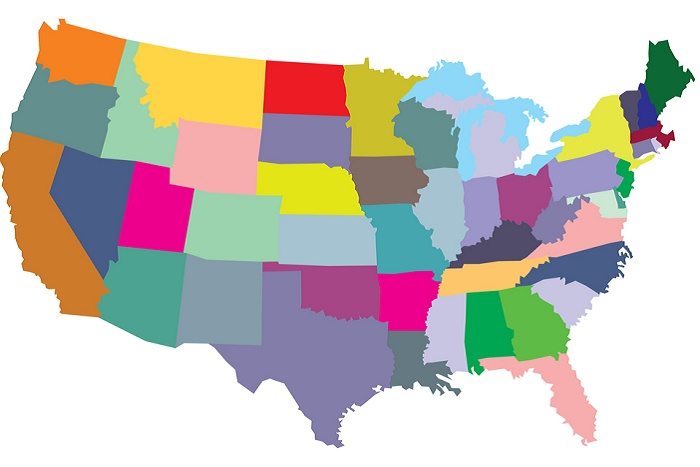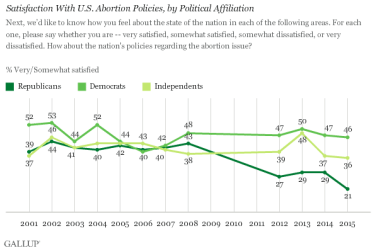Poll: Despite Stricter Abortion Laws, Republicans Aren’t Satisfied
A new Gallup poll finds that fewer Americans are satisfied with "the nation's policies regarding the abortion issue," but the real battle is in the states.

Americans report less satisfaction with “the nation’s policies regarding the abortion issue” than they have in a decade, according to a recently released Gallup poll.
The poll did not include details on what satisfaction or dissatisfaction with abortion laws meant to the respondents. The sharp drop in satisfaction was mostly driven by Republicans who want abortion laws to be more “strict”—even though, during the same time period, Republican legislators have passed an unprecedented number of abortion restrictions that limit access to safe care.
The abortion question was part of Gallup’s annual Mood of the Nation poll, which was first conducted in 2001.
From 2001-2008, at least 40 percent of Americans were satisfied with “the nation’s policies regarding the abortion issue.” Starting in 2012 (the survey wasn’t conducted between 2009-2011), overall support began falling below 40 percent.
Just 34 percent of Americans this year described themselves as satisfied with the nation’s abortion policies.
Satisfaction among Democrats and independents hasn’t changed too dramatically since 2001. Republican satisfaction, however, has taken a sharp drop even as a wave of anti-choice policies have made it through legislatures nationwide.
Forty-three percent of Republicans in 2008 described themselves as satisfied with national abortion policies; in 2015, only 21 percent were. The number of satisfied Republicans fell further just in the past year, from 29 to 21 percent.
Sixty-two percent of Republicans said they were dissatisfied with abortion laws in general, and most, 43 percent, said they were dissatisfied because they want the laws to be stricter. That might seem curious given that stricter abortion laws have become commonplace during the same years that Republican satisfaction has dropped.
“To me, these results really signify a misperception among respondents about the current role that states are playing in abortion policy,” Kelly Baden, director of state advocacy at the Center for Reproductive Rights, told Rewire. “We need to do a better job of making clear the reality of what abortion access looks like on the ground.”
In just the past four years, state legislatures have passed a record-breaking 231 laws restricting abortion, from medically unnecessary ultrasounds and waiting periods to building code requirements that do nothing but close safe clinics.
Gallup’s analysis notes that the drop in Republican support is likely because of the shift to a pro-choice Democratic president. Baden said that the abortion question seems to be “a proxy for satisfaction with the president.” She added that the survey misses the real question of what’s going on with abortion laws in the country.
“When you ask a question about abortion policy under the lens of ‘the nation,’ I don’t think it’s the right question,” Baden said. “We know that the action is in the states.”
Gallup’s analysis also notes that Democrats’ attitudes haven’t gotten more positive under a Democratic administration, probably “because abortion is the law of the land.”
When it comes to what most people think of as the “law of the land” on abortion, Roe v. Wade, support remains high. Almost two-thirds of Americans would oppose overturning the Supreme Court ruling that granted the right to an abortion. And according to one poll, seven in ten voters think that regardless of their own moral beliefs, the government shouldn’t restrict abortion rights.
Government actions, meanwhile, have helped in recent years to make sure that safe and legal abortion access depends on a woman’s zip code or economic status. Some women live hundreds of miles from an abortion provider, and many can’t afford to travel or pay for the procedure. The economic restrictions are made worse due to federal bans on abortion coverage for low-income people.
The poll also suggests that not all Americans understand that abortion is health care. While satisfaction with “the abortion issue” has dropped, satisfaction with “the availability of affordable health care” has shot up from 25 to 43 percent.


